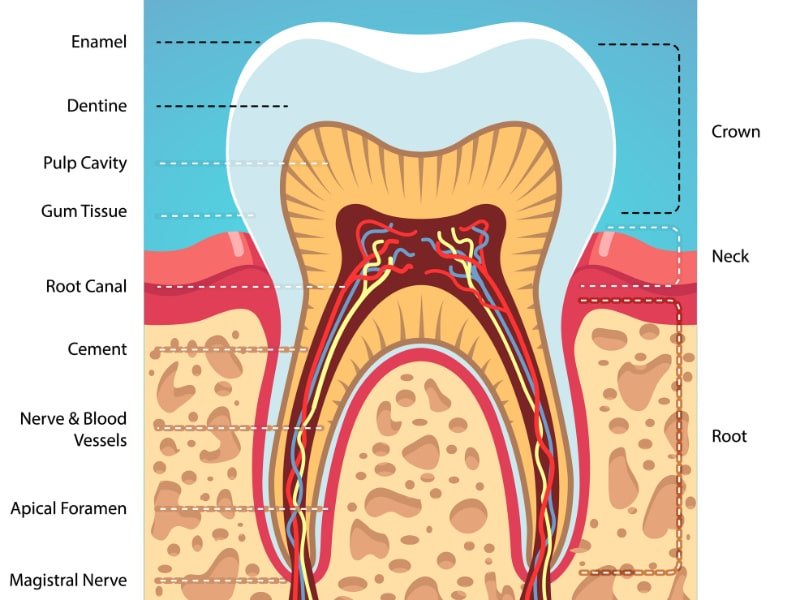What is Root Canal Treatment?
Root canal treatment is a procedure to repair and save a tooth that is badly infected or decayed without actually extracting the tooth. The treatment involves removing an infection from the infected pulp of a tooth.
The treatment aims to prevent future problems such as major toothaches or the spreading of the infection to neighbouring teeth by protecting our decontaminated teeth from future bacterial invasion.
Besides going for routine dental checkups, it is highly advisable for patients to seek root canal treatment early to avoid developing serious complications.

Do You Need Root Canal Treatment?
Some of the signs that you may need a root canal treatment include tooth pain, dental decay, cracks and trauma to the tooth.
1. Cracked, Chipped or Fractured Teeth
Cracked teeth are one of the major factors that could lead to tooth decay and infection. Your tooth may become damaged from an accident or from eating hard foods, causing pain and discomfort.
2. Experiencing Pain Each Time You Eat
Experiencing tooth pain while eating could indicate that your dental nerves are exposed or damaged. This can also happen if you have damaged fillings or if a crown has fallen out.
3. Gum Abscess
Similar to a pimple, a gum abscess is a “pocket of pus” that occurs on the gum or deep inside the tooth. Often caused by an infection, a gum abscess is dangerous and can contaminate the blood if left untreated.
4. Extreme Tooth Sensitivity
Tooth sensitivity is a common condition. However, if it still persists despite using specially formulated toothpastes, the nerves of the tooth may be damaged.
5. Deep Decay
Unlike a shallow cavity, which can be restored with dental fillings, deep decay happens when a tooth is so badly decayed that it affects the nerves, causing extreme pain.
6. Swollen Gums
Infected or decayed teeth can result in inflamed, swollen gums. Swollen gums may also occur due to the infected pulp secreting waste matter.
7. Tooth Discolouration
A major sign that you should get a root canal is when a tooth becomes discoloured. This occurs when the nerve around the tooth is infected or damaged. The tooth may turn a light or dark grey, or even dark charcoal in colour.
If the pain is not bothering me,
why should I undergo root canal treatment?

Even though your tooth may not be hurting, it could still be infected. When the integrity of the enamel layer is compromised, bacteria can enter through these gaps and infect the tooth pulp.
If left untreated, infected pulp tissue can spread the bacteria to your jaw and other parts of your body.
ROOT CANAL POST TREATMENT CARE
Recovery & Follow up
After applying antibacterial medication, the tooth and the surrounding areas will take a few days to recover from the infection.
When the tooth is healed from the infection, the temporary filling will be removed. The tooth will be cleaned and disinfected for a permanent filling.
After the treatment, some may experience mild pain and swelling. The dentist may prescribe some medications to help ease this discomfort.
strengthening the weakened tooth
The treated tooth is often left with little tooth structure after a root canal.
Since a permanent filling is not enough to support biting and chewing forces in the long run, we strongly recommend our patients to get dental crowns immediately to protect and reinforce their weakened tooth.
FAQs
After a root canal treatment, we strongly recommend our patients to get dental crowns immediately to better protect and support the weakened tooth.
With modern techniques and anaesthetics, root canal procedures are almost pain-free. In fact, the pain that comes from toothaches before the treatment is often more painful.
You may experience mild pain after the treatment, but this pain should disappear over a few days. Avoid chewing hard and crunchy foods like nuts until your tooth recovers, or until the pain subsides. Pain experienced after teeth crowning is also often temporary as your gums and jaws are simply getting used to the newly placed crown.
If the pain or swelling persists, consult your dentist. Rest assured that we are here to make your visit as comfortable and pain-free as possible.
The root canal procedure can take about an hour to complete. However, the entire treatment process may occur over a single or multiple visits, depending on several factors such as complexity of the infection, number of treatments needed and the condition of the tooth.
While dental implants are widely prescribed, there are many instances where root canal treatment is still strongly recommended. Extracting a painful tooth and replacing it with an implant might seem simpler, but that may not suit everyone.
Dental implants, when placed under compromised conditions, may cause complications. Furthermore, a natural tooth is usually more beneficial for the patient as compared to an artificial replacement. Dental implants should only be considered at the end of your tooth’s life cycle.
As our life expectancy has increased over the years, we believe that the lifespan of our natural teeth should also be extended to better match our lifestyles.

